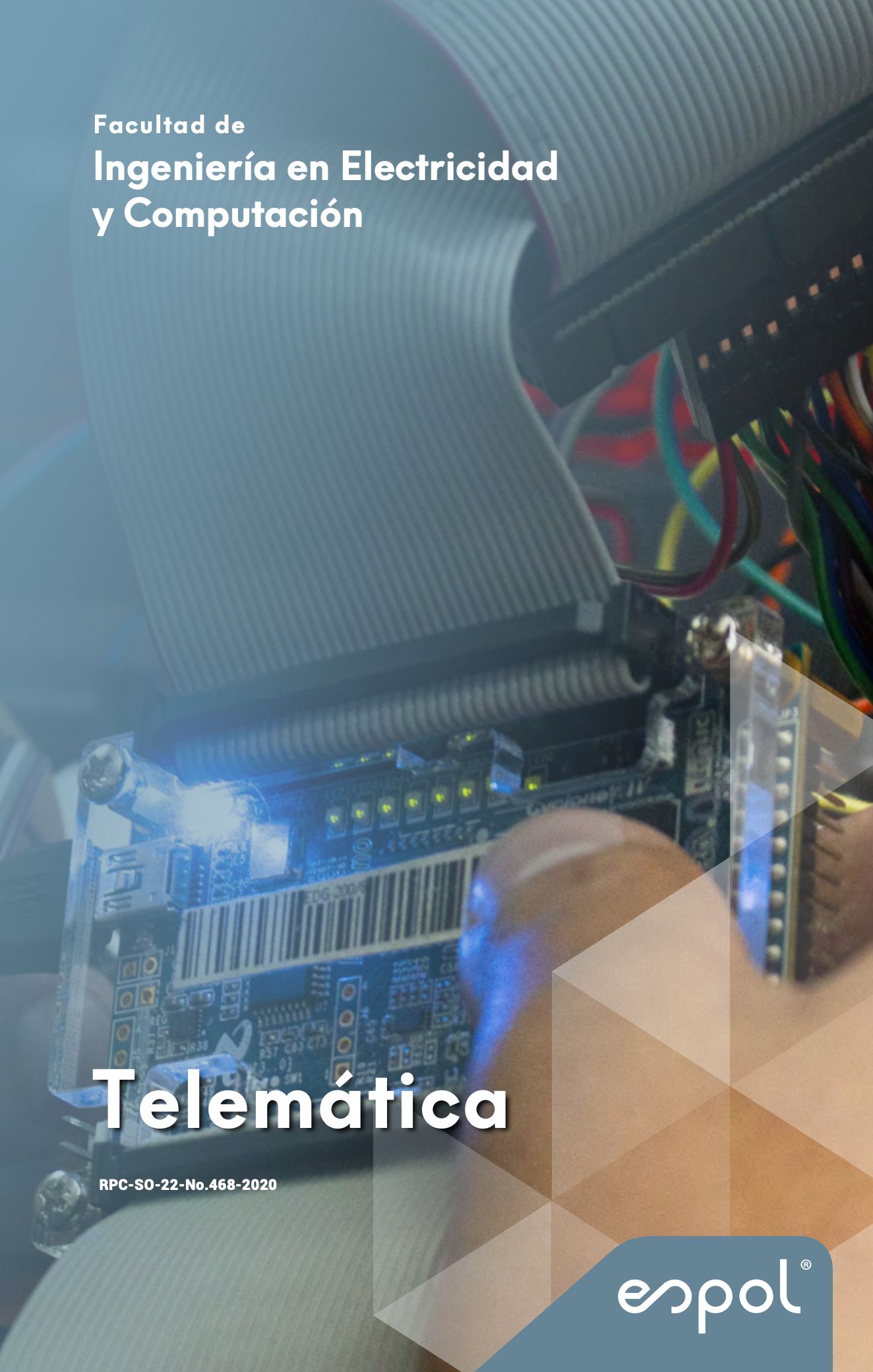
The degree provides solid knowledge in the areas of networks and data communication, information technology and technological infrastructure, providing them with the skills to design, implement and direct multidisciplinary technological projects.
Mission
To train professionals of excellence, leaders and entrepreneurs of projects in the areas of data networks, technological infrastructure and telematics services. To engage in scientific research and technology innovation related to network-based systems and services with solid ethical and moral values to contribute to the technology development of Ecuador.
Core Components of the Program
The Telematics Engineering program encompasses a comprehensive set of knowledge, skills, and methods that alumni must acquire upon completing must acquire upon completing the program. This ensures that its graduates are prepared for professional activities, ensuring the acquisition of the necessary skills and competencies. To achieve this, a group of knowledge domains has been defined, with associated courses designed to facilitate the development of the skills that a graduate of our program should possess. These domains include 6 professional axis: Hardware, Software, Networking and Network Services, Systems, Information Technologies, and the Internet of Things.
International Accreditation
The Telematics Engineering program is accredited by the Engineering Accreditation Commission of ABET.
The Telematics Engineering program is certified with the EUR-ACE label awarded by the European Network for Accreditation of Engineering Education.
* Undergraduate tuition/fees:
The Constitution of the Republic of Ecuador in its Article 356, among other principles, establishes that third-level public higher education will be tuition/fees free. Zero cost education is linked to the academic responsibility of the students.
Graphs show the figures in real time, at the time of the query
High school graduates who apply for the Telematics degree must be creative, have teamwork skills and an interest in obtaining
knowledge in information technologies, to develop comprehensive projects based on networks and the Internet.
EDUCATIONAL OBJECTIVES
The Telematics Engineering alumni from the Escuela Superior Politécnica del Litoral will have in the 3-5 years period the following professional practices:
- Gain new technical and scientific knowledge through professional practice or postgraduate studies in order to improve their skills in contemporary issues related to information and communication technologies (ICT) and technological infrastructure.
- Lead the development and implementation of technological projects, considering social, economic and environmental contexts, within an ethical and moral framework that generates employment and innovation, to meet the needs of the current market and contribute responsibly to the productive sector of society.
- Communicate effectively as professionals to be assertive in interdisciplinary and multicultural work groups.
STUDENT OUTCOMES
Since 2019:
SO 1. An ability to identify, formulate, and solve complex Telematics Engineering problems by applying principles of engineering, science, and mathematics.
SO 2. An ability to apply design of Telematics Engineering systems, to produce solutions that meet specified needs with consideration of public health, safety, and welfare, as well as global, cultural, social, environmental, and economic factors.
SO 3a. An ability to communicate effectively in Spanish with a range of audiences (oral and written form).
SO 3b. An ability to communicate effectively in English with a range of audiences.
SO 4. An ability to recognize ethical and professional responsibilities in Telematics Engineering situations and make informed judgments, which must consider the impact of engineering solutions in global, economic, environmental, and social contexts.
SO 5. An ability to function effectively on a team whose members together provide leadership, create a collaborative and inclusive environment, establish goals, plan tasks, and meet objectives.
SO 6. An ability to develop and conduct appropriate experimentation, analyze and interpret data, and use Telematics Engineering judgment to draw conclusions.
SO 7. An ability to acquire and apply new Telematics Engineering knowledge as needed, using appropriate learning strategies.
SO 8. Design real Telematics Engineering solutions that propose unique value in response to specific needs considered from the point of view of those involved.
After 4 years of study, you will be able to design, manage, implement and operate network-based systems and services. You will have the necessary skills to lead technological projects multidisciplinary teams that integrate hardware and software solutions, using modern information and communication technologies, on a small and large scale, in context with social responsibility and sustainable development.
OCUPATIONAL PROFILE
The Telematics engineer will be able to use his knowledge in companies that have departments of Systems, Technological Infrastructure, Technical Support and Networks. The professional in this branch may perform as:
- Information and Communication Technologies Manager
- Director of network-based systems and services projects
- Telecommunications.
- Director of Data Centers.
- Businessman.
- Specialist in solutions based on networks and Internet.
- Director of Network Operations Centers.
- Technological Infrastructure Manager.
- Technological project consultant.
To earn a degree in Telematics Engineering, students must meet the following criteria:
- Complete a minimum of 52 credits in Professional Training, equivalent to 100 ECTS.
- Complete a minimum of 20 credits in Humanities elective courses, equivalent to 38.4 ECTS.
- Complete a minimum of 27 credits in Math and Basic Sciences, equivalent to 63.8 ECTS.
- Complete a minimum of 336 hours of pre-professional internships, including 96 hours of community service internships and 240 hours of pre-professional business internships, which amounts to 7 credits or 13.4 ECTS.
- Pass the graduation process, representing 8 credits or 15.4 ECTS.
The Capstone Project is a culminating requirement for graduation. These projects provide students with the experience of applying acquired knowledge and skills to the needs of society, with a focus on sustainability.
The IDEAR Fair showcases all Capstone projects, offering students a valuable opportunity to showcase their work and hone soft skills such as communication and teamwork. It is also a space for students to network with potential clients and future employers.
Explore all of the Capstone projects completed by the Telematics Engineering program.

